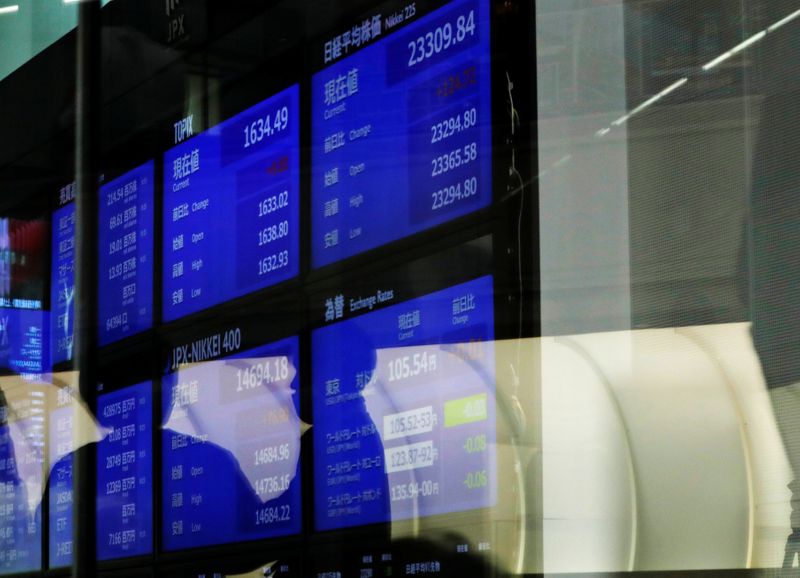By Hideyuki Sano and Koh Gui Qing
TOKYO/NEW YORK (Reuters) - Global stocks eyed an all-time peak while the dollar and U.S. bond yields stayed sluggish on Friday on hopes that a divided U.S. legislature would hinder large government borrowing, which could pave the way for even more central bank stimulus.
Investors expect Democrat Joe Biden to beat President Donald Trump and the Republicans to retain control of the Senate, allowing them to block Democrat policy such as corporate tax hikes and debt-funded spending on infrastructure.
"With the prospects of fiscal stimulus constrained by a likely gridlock in Washington, monetary policy will likely have to do heavy lifting, boosting risk assets and putting pressure on the dollar," said Hiroshi Watanabe, economist at Sony Financial Holdings.
A sense that a Biden presidency will be more predictable than Trump's is also underpinning risk sentiment, even though investors saw no quick rapprochement between Washington and Beijing on trade and other issues.
MSCI's all-country index of the world's 49 markets (MIWD00000PUS) inched up 0.05%, bringing its record peak hit in September within sight.
Japan's Nikkei average rose 0.9% (N225) to a 29-year high while MSCI's broadest gauge of Asian Pacific shares outside Japan rose 0.3% near 3-year high. (MIAPJ0000PUS).
European stocks are seen giving up some of their big gains this week, with Euro Stoxx 50 futures (STXEc1) down 0.8% and FTSE futures (FFIc1) falling 0.5%.
U.S. S&P futures (ESc1) dropped 0.7% on profit-taking, a day after the underlying stock index (SPX) rose 1.95%.
Trump's attempts to pursue lawsuits challenging the election process in several states have so far done little to change investors' expectations on the election outcome.
Still, some market players are wary of street protests getting violent, after Trump claimed the election was being "stolen" from him.
U.S. bond yields drifted lower, with 10-year Treasury yield (US10YT=RR) falling to 0.766%, more than 150 basis points below the pre-U.S. election level seen on Tuesday. It had struck a three-week low of 0.7180% on Thursday.
The Federal Reserve kept its monetary policy loose and pledged to do whatever it takes to sustain a U.S. economic recovery.
With COVID-19 raging in the United States and parts of Europe, many investors assume more monetary stimulus is inevitable.
The Bank of England expanded its asset purchase scheme on Thursday while the European Central Bank is widely expected to announce more stimulus next month.
Investors also focused on the prospects of stalled talks on a U.S. coronavirus relief package restarting.
"We still anticipate that there will be a fiscal package in excess of $1 trillion next year," said James Knightley, chief international economist at ING Group in New York.
"This stimulus, when combined with a long-anticipated COVID-19 vaccine, can really lift the economy and drive growth. We consequently remain very upbeat on the prospects for 2021 and 2022."
In currency markets, lower yields undermined the dollar against its rivals.
The dollar index touched a two-month low of 92.473 and last stood at 92.718 (=USD).
The euro traded at $1.1810 (EUR=) while the offshore Chinese yuan hit a near 2 1/2-year high of 6.6000 to the dollar
A softer dollar supported the Japanese yen
Gold
Even bitcoin (BTC=BTSP) rode high, notching up a gain of 10% on Thursday and hitting a high last seen in January 2018.

Oil prices were sluggish as new lockdowns in Europe to contain the coronavirus disease darkened the outlook for crude demand. Brent crude (LCOc1) was down 1.73% at $40.22 a barrel.